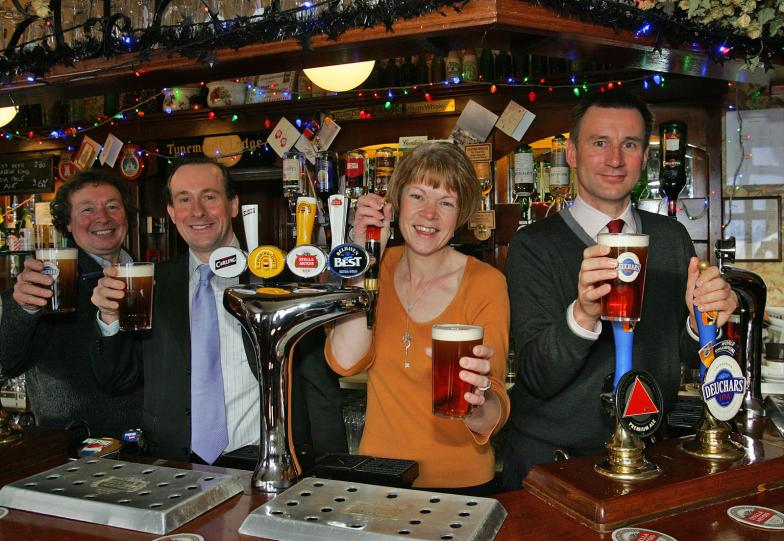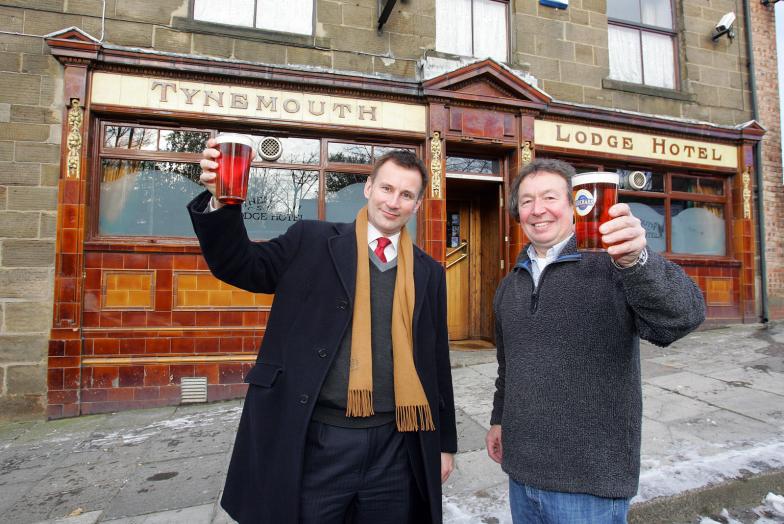I was in my mid-twenties and living on Tyneside at the outbreak of CAMRA in 1971.
The biggest pub-owner in the North East, Scottish and Newcastle Breweries, had removed all real ales from their bars some 7 years earlier, although Draught Bass was still on sale in most Bass houses, so there was no problem getting a pint of Britain’s Finest. Also, Tetleys had a foothold in the area and cask Tetley Bitter was fairly ubiquitous and a great session drink.
In those days at least you knew where you stood : If there was an illuminated blue star outside a pub, it was a Newcastle house with processed beers, likewise if the symbol was a red triangle or a jovial huntsman there was a sporting chance that a pint of decent Bass or Tetleys awaited.
I opened my own pub in Tynemouth in 1983, at which time little had changed other than the brief incursion of Matthew Brown beers into Tyneside, only for them to be taken over (at the second attempt) by S&N in 1987 and who quickly shut their Blackburn brewery.
Matty Brown were famed for their award-winning, mind-blowing, 5% Slalom D Lager, which S&N quickly delisted in favour of Foster’s pseudo-Aussie fizz with more brewery workers jobs down the pan.
Interesting that Slalom D was brewed at the Lakeland Lager Brewery at Workington, right by the docks and formerly the Workington Brewery, but enough said as it was not a real ale.
Whitbread were a bit thin on the ground on Tyneside in 1971, although they were still brewing real ale at their Grade 1 Listed Castle Eden Brewery which they had bought from Nimmos in the early sixties and where they brewed Castle Eden Ale. Sadly, this is now a housing estate, although the original Georgian buildings are intact.
As Newcastle Breweries had taken out all real ales by 1964, having replaced Newcastle Ordinary, Exhibition and Scotch Special with Starbright and Younger’s Tartan, Tyneside really was something of a real ale beer desert by 1971.
Despite there being no BII trade certificates for bar staff in 1971, I contend that in general, pubs were better run in those days. The tenant or brewery manager was often ex armed forces or ex Police and in the case of Vaux Brewery, they had a penchant for taking on ex professional footballers.
There was no need for doormen and Pubwatch had not been invented, but trouble was less of a problem then than it is now, despite that fact that a lot more beer was sold in pubs in those days.
The Police made unannounced weekly walkthrough visit to all pubs and it has to be said that they were treated with great respect.
Licensing was controlled by the Magistrates and was much better regulated than it is in 2011 under local council control and a lot cheaper for the licensees.
It is Tony Blair who we have to thank for taking licensing from the Magistrates who had overseen it for over 800 years and who had performed their duties impeccably.
In 1971, trading hours were 11-3 and 5.30 -10.30 weekdays and 12-2, 6-10.30 on a Sunday.
Pubs filled up quickly for the 5.30 early doors session and the Sunday lunchtime 2 hour session in most pubs was their busiest of the week.
Shops were closed on a Sunday and it was the norm for a drinking man to return from the pub at 3pm for dinner with the family, have a snooze then out again at six o’clock.
It was said that many a bairn on Tyneside was conceived on a Sunday afternoon !
The working men’s clubs were in their heyday in the early seventies, selling cheap tank beer from their own Federation Brewery, no food, but plenty of entertainment in their concert rooms. But the clubs were their own worst enemy, not moving with the times.
It was a sad day for Tyneside when the Federation Brewery, established in the 1920s by working men, shut its doors.
Sir John Fitzgerald Limited had a chain of free houses on Tyneside, with real ale in some of them, including the Crown Posada where a fine pint of Draught Bass was on sale and which was extremely popular with barristers from the nearby courthouse. They also kept a good pint of Sam Smith’s Old Brewery Bitter in The Bacchus.
There was a bit of Camerons and Vaux real ale on Tyneside, but neither were popular north of the River Tyne.
I can not recall drinking in any privately-owned free houses on Tyneside in the early seventies as they simply did not exist. The big brewers had a stranglehold in the area and they guarded their territory with a watchful eye.
Forty years down the line and what a difference.
For a start, there are now more supermarkets than there are pubs and supermarkets sell a lot more alcohol than public houses.
It is arguable that the supermarkets and to a lesser extent corner shops are directly responsible for the big surge in alcohol-related illness by selling cheap booze. In my experience, not many alcoholics use pubs, but our politicians can’t see the wood for the trees and continue to persecute publicans.
In common with the rest of the UK there have been mass closures of pub and clubs, but there are many more privately owned free houses on Tyneside than there were in the seventies and there are a good few small breweries, the oldest being Big Lamp and Mordues. Also it has been great to see the emergence of smaller mainstream brewers such as Black Sheep in nearby north Yorkshire and a relief that Samuel Smith continues to thrive in the 21st century, as does the Fitzgerald chain of pubs.
Vaux brewery in Sunderland was sold to Tesco and still remains undeveloped. It is a sad irony that Vaux were getting their act together on the real ale front when there was a bitter boardroom squabble, resulting in the brewery closing in 1999, after 150 years of brewing and with the loss of 700 jobs. They still had a team of dray horses for local deliveries right to the end. Perhaps they should have stayed a family-owned firm like Sam Smiths of Tadcaster instead of going Public.
CAMRA supported the ill-fated Beer Orders brought in in 1989 and although it forced the large brewery groups to reduce their tied estates to 2000, it resulted in the brewers spinning off purely pub-owning companies (‘Pubcos’) such as Punch and Enterprise and these were much, much worse than their predecessors and are currently just about bust and en route have closed thousands of potentially viable pubs.
We have the Tories to indirectly thank for the creation of the Pubcos.
The Beer Orders, brought in by the Tories under Lord Young’s guidance was a total disaster and had a devastating effect on the UK beer and pub market. In 1989, the two biggest breweries in the UK owned some 16,000 pubs between them, but in 2004 Punch and Enterprise owned more tied houses than that and yet did not brew a single drop of beer. The Beer Orders were revoked in 2003, but by then the damage was done. The Beer Orders could only have been conceived by blinkered politicians.
It is the same Lord Young who was sacked by the Tories in 2010 when he declared to the nation that ‘we have never had it so good’.
He clearly lives in his own little world.
Better that he had gone into the family business of flour-importing, as he did not understand the workings of the pub industry nor the needs of pub goers.
It is a safe bet that like most of his colleagues in the Palace of Westminster, the noble Lord more than likely never ever uses a public house and regards them as a quirky little things for Commoners.
It has to be said that the nature of the product that the four Founding Fathers of CAMRA set out to protect has changed dramatically.
In 1971 a typical real ale took at day or two to settle, having a high yeast content and the hoppy ales really did have lots of leafy hops in the barrel.
For example, Draught Bass took approximately 2 days to clear, but the end product was truly superb.
By trying to make modern real ales idiot-proof, the brewers have blandardised the beer.
It was said that Bass could go cloudy if a jacket was put onto the barrel !
Contrast this with typical real ales from micro brewers in 2011.
For example, when I was given the task of tapping and spiling some 70 different real ales at a Cockermouth CAMRA beer festival, within one hour of all the beers going onto the gantry, every single one was as clear as a bell and ready to serve. Real ale ?
Drinkable yes, easy to look after, but lacking the body and full flavour of the real ales of yesteryear that the founders of CAMRA set out to protect.
I would like to see the return of some difficult-to-look-after Real real ales, but either way, modern real ales are 100% better than smoothflow keg beers.
Forty years down the line, The Campaign for Real Ale is alive and well and with a record number of members.
My Life Membership subscription in the early seventies has proved to be a good financial investment and I’ve beaten the Actuaries at their own game.
The continuance of real ale in the UK is dependent on the survival of the public house.
The message is quite simple, use them or lose them.
Hugh Price
Tynemouth Lodge Hotel


